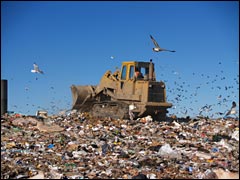Hi Umbra,
Is there an environmentally preferable choice between sending your trash to a landfill or an incinerator? I know to think of the three R’s first, but what’s the better way to dispose of the remainder? Incinerators convert waste into energy but generate air pollution. Landfills (ideally) recover and utilize methane but much of the waste will never decompose. So if one has a choice, what’s the best of two evils?
Lisa Drake
Manchester, N.H.
Dearest Lisa,
Do you actually have a choice? I don’t. Our waste is picked up and taken to the Rodentitron Site, where it is gnawed into tiny particles by millions of rats and then repackaged and sold as veggie burgers. I wish it went to the Goats-R-Us Site, but no luck.

Landfill, ho!
Photo: iStockphoto
Oh, ho ho. I have to joke because I’ve had a heck of a time finding the answer to this question. The answer appears to be: It depends. It depends on the landfill and the incinerator, and it depends on your own priorities in your community. You’re right that attending to the three Rs is no trivial matter, and is the true answer. We must reduce our waste. Americans produce 4.5 pounds of trash a day per person, according to Keep America Beautiful. But everyone will make some trash at some point. So let’s take a quick look at the basics.
A landfill is basically a yummy trash napoleon with a delightful leachate coulis. It is a clay- and plastic-lined chasm filled with compacted garbage delicately layered with soil, surrounded and interrupted by devices that drain leachate and measure containment efficacy. The problems with landfills include: they’re there — they take up space and are visible reminders of garbage; they can ooze potentially toxic goo and contaminate groundwater; they may be old enough to have unlined areas; and they produce methane, a powerful greenhouse gas, during decomposition. Some landfills capture that methane and put it to good use, and modern landfills mitigate their other problems with varying degrees of success. The main positive of landfills: a good landfill can hold all our garbage successfully in a fairly inert setting.
If there is a food simile for incinerators — some of which are known as “waste-to-energy facilities” — it is a culinary disaster. You take a giant pile of goo, some of which has value, burn the heck out of it, and create a pile of ashes not recommended for consumption. The byproducts of incineration are gases out the smokestack, e.g., dioxin, and ash that is landfilled and can contain heavy metals. Adding to those problems is the energy required to burn the garbage. Upsides of incinerators include: they make trash solids smaller, and waste-to-energy facilities recapture some energy.
In the U.S., landfills and incinerators are overseen by the EPA’s Office of Solid Waste, and at their website you will find more general information, including fervent support of recycling, as well as contacts for your state.
Researchers have evaluated the entire cycle of waste disposal from pickup to burn or landfill, and quantified the resulting solid wastes, pollution, energy use, and so on. Ofttimes they even weigh the negatives, such as toxic releases, against the benefits, such as energy production. Do we have an objective answer based on generalized data? It depends! I’ll just point you to two studies for now: one prefers landfills over incinerators, and the other is a review [PDF] by Environmental Defense of other analyses, demonstrating the complexity of your question — and, again, the supremacy of recycling.
When the incinerator and the landfill go head-to-head, the match-up is pretty dang complicated. Landfills release methane, but incinerators release more carbon dioxide and sulfur dioxide. Landfills have water-pollution problems, incinerators have air-pollution problems. Incinerators can generate energy from garbage — but let’s face it, there are better ways to make energy than by creating consumer goods only to burn them. From the putzing around that I did on your behalf, I would say I prefer a nice landfill to an incinerator. You didn’t say if this question was mere curiosity or related to an actual dilemma. If the latter, I would get ahold of the toxic releases of the specific waste management facilities near you and decide on that basis. How? They should be public record, held for you by your municipality or by the facility itself.
Gassily,
Umbra

